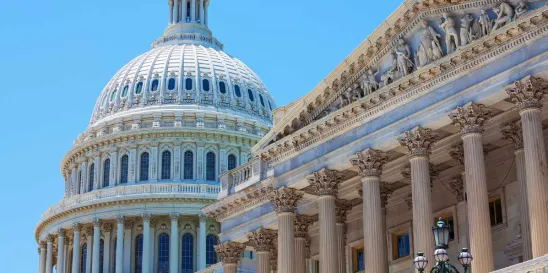The 2024 Washington State Legislature passed Substitute Senate Bill (S.S.B.) 5935 in February 2024, and Governor Jay Inslee signed the bill into law on March 13, 2024, updating and clarifying Washington law regarding restrictive covenants (RCW 49.62 et seq.). The new provisions take effect on June 6, 2024.
Quick Hits
- Governor Jay Inslee signed legislation that updates and clarifies Washington’s law regarding restrictive covenants.
- The legislation provides that a “noncompetition covenant” “includes an agreement that directly or indirectly prohibits the acceptance or transaction of business with a customer.”
- Customer nonsolicitations are now limited to current customers.
- The new provisions take effect on June 6, 2024.
Importantly, newly enacted S.S.B. 5935 clarifies some ambiguities in the existing law and expands other protections in the law, which Governor Inslee signed into law in 2019 and took effect in 2020.
The following are the key changes to the law.
Updated Definitions of “Noncompetition Covenant” and “Nonsolicitation Agreement”
The prior definition of “noncompetition covenant” in RCW 49.62.010(4) included a broad definition that included any “covenant, agreement, or contract” that “prohibited or restrained [someone] from engaging in a lawful profession, trade, or business of any kind.” The law also excluded from its definition nonsolicitation agreements. The definition, however, did not address the standard provision often found in nonsolicitation clauses that prohibits accepting business from a customer of the prior employer. The new “noncompetition covenant” definition clarifies this issue and now states that “[a] ‘noncompetition covenant’ also includes an agreement that directly or indirectly prohibits the acceptance or transaction of business with a customer.”
In addition to excluding nonsolicitation agreements from the broad definition of noncompetition covenants, the prior definition also excluded agreements when the person signing the agreement purchased or sold the goodwill of a business or acquired or disposed of an ownership interest. Under the new law, the sale, acquisition, or disposal of an interest in a business must be “one percent or more of the business.”
Under the restrictive covenant law, the legislature narrowly defined nonsolicitation agreements as only those agreements that prohibited soliciting an employee to leave the employment of an employer and that prohibited soliciting a customer to cease or reduce doing business with the employer. The new definition of nonsolicitation agreement now makes it clear that the nonsolicitation of customers relates only to “any current customer of the employer.” (Emphasis added.) Thus, an agreement that prohibits soliciting a former or prospective customer is no longer properly defined as a nonsolicitation agreement.
Presentation of Noncompetition Covenant Terms at Earliest Possible Offer
To be supported by sufficient consideration without offering something additional, the 2019 version of the noncompetition law required employers to disclose the terms of the noncompetition covenant in writing no later than when the offer was accepted. The new law makes clear that the acceptance from the offeree includes the “initial oral or written acceptance” from the offeree. Thus, employers must now take care to provide the terms of the noncompetition covenant in writing at the time of the initial offer to ensure that the prospective employee has the terms in writing before accepting the offer.
Clarified Choice-of-Law Provision Requirements
The new revisions clarify the prior requirements that noncompetition covenants be adjudicated in Washington and that the choice of law not deprive an employee of the protections and benefits of Washington law. Under the new revisions, the law clarifies these requirements and prohibits any provision that “allows or requires the application of choice of law principles or the substantive law of any jurisdiction other than Washington state.” In effect, any noncompetition covenant for a Washington-based employee or independent contractor must be litigated in Washington and have Washington law applied to the agreement.
Limits on Enforcement Actions With Regard to Pre-2020 Agreements
Under the 2019 law, an employee could not bring a declaratory judgment action to invalidate a noncompetition covenant agreed to before January 1, 2020, so long as “the noncompetition covenant [was] not being enforced.” The 2024 law now states that an employee cannot bring a cause of action to invalidate a noncompetition covenant agreed to before January 1, 2020, so long as “the noncompetition covenant is not being enforced or explicitly leveraged.” (Emphasis added.) The law does not define what “explicitly leveraged” means, but employers may want to take care to balance the risks of attempting to enforce or leverage pre-2020 restrictive covenants that may not on their face be enforceable.
Increased Number of Potential Plaintiffs
The new law permits not only persons party to a noncompetition covenant to bring a cause of action for damages (as was the case under the 2019 law), it now permits a broader set of plaintiffs. Under the new law, any party aggrieved by a noncompetition covenant may bring a cause of action for damages because the law has removed the limitation that the party who can bring the cause of action must be a party to the agreement. The new law does not define who is aggrieved and thus creates the opportunity for other plaintiffs to bring a cause of action on an agreement to which they are not a party. It is not yet known if this could be customers or even a potential new employer.
Key Takeaways
Employers with Washington-based employees and independent contractors may want to note S.S.B 5935’s updates to Washington’s law regarding restrictive covenants (RCW 49.62 et seq.) when drafting restrictive covenants and be judicious with regard to the enforcement of pre-2020 agreements. Employers of Washington-based employees and independent contractors may also once again want to evaluate existing agreements with employees and independent contractors to ensure they have the most enforceable agreements in place.




 />i
/>i

